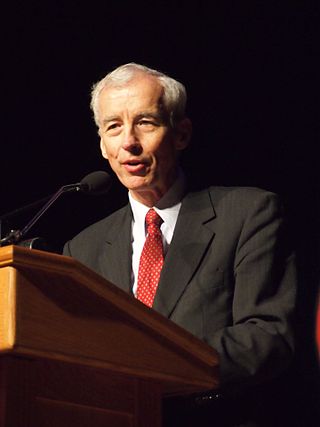Related Research Articles
Public policy is an institutionalized proposal or a decided set of elements like laws, regulations, guidelines, and actions to solve or address relevant and real-world problems, guided by a conception and often implemented by programs. The implementation of public policy is known as public administration. Public policy can be considered to be the sum of a government's direct and indirect activities and has been conceptualized in a variety of ways.
Development communication refers to the use of communication to facilitate social development. Development communication engages stakeholders and policy makers, establishes conducive environments, assesses risks and opportunities and promotes information exchange to create positive social change via sustainable development. Development communication techniques include information dissemination and education, behavior change, social marketing, social mobilization, media advocacy, communication for social change, and community participation.

Together, legal psychology and forensic psychology form the field more generally recognized as "psychology and law". Following earlier efforts by psychologists to address legal issues, psychology and law became a field of study in the 1960s as part of an effort to enhance justice, though that originating concern has lessened over time. The multidisciplinary American Psychological Association's Division 41, the American Psychology–Law Society, is active with the goal of promoting the contributions of psychology to the understanding of law and legal systems through research, as well as providing education to psychologists in legal issues and providing education to legal personnel on psychological issues. Further, its mandate is to inform the psychological and legal communities and the public at large of current research, educational, and service in the area of psychology and law. There are similar societies in Britain and Europe.
The Initiative for Policy Dialogue (IPD) is a non-profit organization based at Columbia University in the United States.
Evidence-based policy is a concept in public policy that advocates for policy decisions to be grounded on, or influenced by, rigorously established objective evidence. This concept presents a stark contrast to policymaking predicated on ideology, 'common sense,' anecdotes, or personal intuitions. The approach mirrors the effective altruism movement's philosophy within governmental circles. The methodology employed in evidence-based policy often includes comprehensive research methods such as randomized controlled trials (RCT). Good data, analytical skills, and political support to the use of scientific information are typically seen as the crucial elements of an evidence-based approach.
Mathematica Inc., formerly Mathematica Policy Research, is an American research organization and consulting company headquartered in Princeton, New Jersey. The company provides data science, social science, and technological services for social policy initiatives. Mathematica employs approximately 1,600 researchers, analysts, technologists, and practitioners in nine offices across the United States: Princeton, New Jersey; Cambridge, Massachusetts; Chicago, Illinois; Washington, DC; Ann Arbor, Michigan; Seattle, Washington; Woodlawn, Maryland; Tucson, Arizona and Oakland, California. In 2018, the company acquired EDI Global, a data research company based in the United Kingdom and Africa. Mathematica's clients include federal agencies, state and local governments, foundations, universities, private-sector companies, and international organizations.

Paul R. Pillar is an academic and 28-year veteran of the Central Intelligence Agency (CIA), serving from 1977 to 2005. He is now a non-resident senior fellow at Georgetown University's Center for Security Studies, as well as a nonresident senior fellow in the Brookings Institution's Center for 21st Century Security and Intelligence. He was a visiting professor at Georgetown University from 2005 to 2012. He is a contributor to The National Interest.
The Institute for Defense Analyses (IDA) is an American non-profit corporation that administers three federally funded research and development centers (FFRDCs) – the Systems and Analyses Center (SAC), the Science and Technology Policy Institute (STPI), and the Center for Communications and Computing (C&C) – to assist the United States government in addressing national security issues, particularly those requiring scientific and technical expertise. It is headquartered in Alexandria, Virginia.
The LAPOP Lab is a research institute specializing in the development, implementation, and analysis of public opinion surveys. Founded by Mitchell A. Seligson over two decades ago, its principal focus is on governance and democracy in Latin America. The AmericasBarometer is the best-known survey produced by LAPOP. It is the most extensive survey of democratic public opinion and behavior that covers the Americas. It measures democratic values and behaviors using voter surveys. Elizabeth Zechmeister is the director of LAPOP. Noam Lupu is associate director of LAPOP.
The Carl Vinson Institute of Government (CVIOG) is an organization that works closely with officials and employees from state and local governments in the U.S. state of Georgia and internationally to help them achieve their missions and improve public service. CVIOG is a unit of the Office of Public Service and Outreach at the University of Georgia (UGA) in Athens, Georgia.
Public engagement or public participation is a term that has recently been used to describe "the practice of involving members of the public in the agenda-setting, decision-making, and policy-forming activities of organizations/institutions responsible for policy development." It is focused on the participatory actions of the public to aid in policy making based in their values.

The Frank Batten School of Leadership and Public Policy is the public policy school of the University of Virginia.

Since the September 11 attacks, doubts have been raised about the mainstream account of events. There have been a number of 9/11 conspiracy theories with some suggesting that Israel was involved in the attacks and that members of the U.S. government may have deliberately covered-up and falsified events, in order to hide negligence, complicity, or even having been the perpetrator of the attacks.
William Ascher is the Donald C. McKenna Professor of Government and Economics at Claremont McKenna College in Claremont, California, where he served as academic vice president and dean of the faculty (2000–2005). Previously, as professor of public policy and political science, Ascher directed Duke University's Center for International Development Research (1985–2000). He studies strategic planning, policymaking in developing countries, natural resource and environmental policy, Latin American and Asian political economy, political psychology, and forecasting methods.
Public Knowledge is a non-profit Washington, D.C.–based public interest group. Founded in 2001 by David Bollier, Gigi Sohn, and Laurie Racine, Public Knowledge is primarily involved in the fields of intellectual property law, competition and choice in the digital marketplace, and an open standards/end-to-end internet.
Albert Hadley Cantril, Jr. was an American psychologist from the Princeton University, who expanded the scope of the field.
The Duke University Center for Child and Family Policy was established on July 1, 1999, with Kenneth A. Dodge, William McDougall Professor of Public Policy and Professor of Psychology and Neuroscience, as its director. The center brings scientific research on children and families into the policymaking arena.
The University of Maryland, Baltimore County (UMBC) features a variety of research centers and institutes both based on the campus and affiliated with other academic institutions. These centers and institutes listed below seek out to expand their research, educate, and promote partnerships between the university and the Baltimore-Washington Metropolitan Area and beyond.
The Youth Parliament or Youth Parliament Program (YPP), an integral part of the Swatantrata Center, is a liberal public policy think-tank based in India which focuses on ideas and policies that cause human flourishment and India's Future Foundation, Foundation for Democratic Reforms under the leadership of Raghavendar Askani and Dr. Jayaprakash Narayan for the youth, to speak up and make an impact on the change agenda for the country.
Public policy research is a multidisciplinary field that delves into the systematic examination and comprehensive analysis of policy matters and their far-reaching implications on society as a whole. The subject matter pertains to the exploration of diverse facets of public policy, encompassing its conception, execution, and assessment. This dynamic subject matter encompasses a wide range of dimensions, spanning from the inception and conceptualization of policies to their actual implementation and subsequent evaluation. The study of public policy involves a nuanced exploration of the intricate interplay between various stakeholders, including policymakers, interest groups, and the general public, as well as an examination of the societal, economic, and political factors that shape policy decision-making processes. By employing a rigorous and evidence-based approach, researchers in this field aim to shed light on the complexities of policy formulation, identify potential challenges and opportunities, and contribute to the enhancement of public policy effectiveness and societal well-being. Through their scholarly endeavors, public policy researchers play a vital role in informing decision-makers, advocating for evidence-informed policy approaches, and fostering more informed and participatory democratic governance.
References
- ↑ "Program for Public Consultation".
- ↑ "Voice of the People".
- ↑ "policymaking simulation".
- ↑ WorldPublicOpinion.org